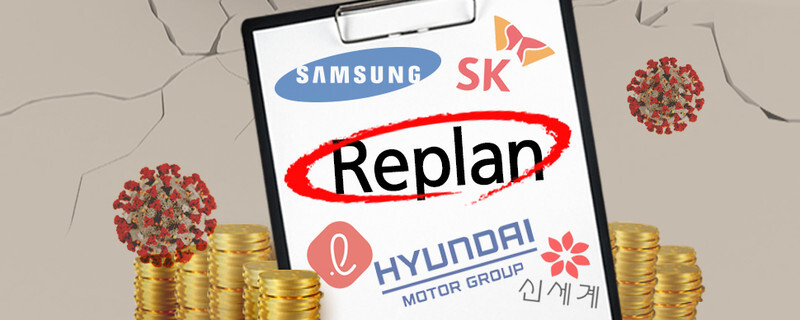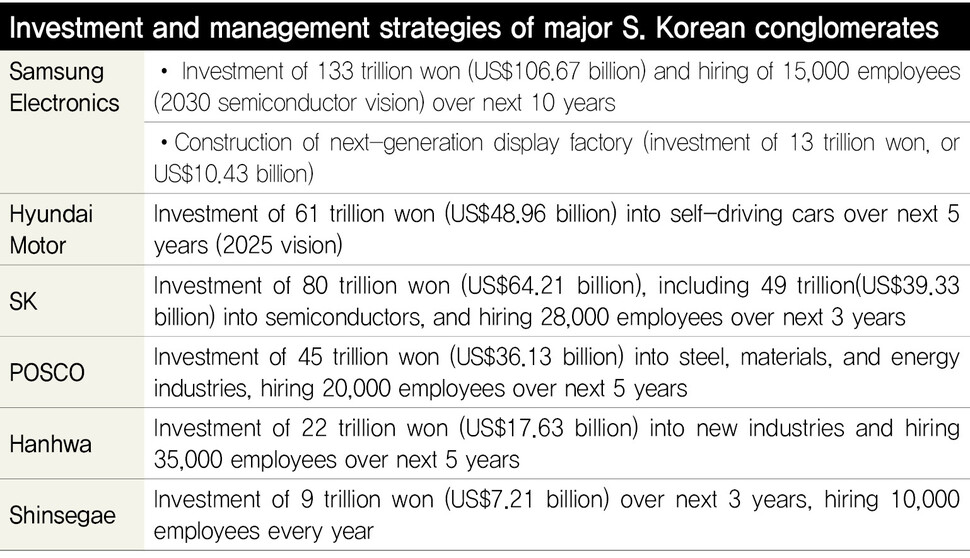hankyoreh
Links to other country sites 다른 나라 사이트 링크
S. Korean conglomerates adjust investment plans and management strategy in face of coronavirus setbacks
“The travel and tourism industries are facing a challenge to their very survival.”

Lee Boo-jin, CEO of Hotel Shilla and the oldest daughter of Samsung Lee family, referred to “survival” in remarks at a Mar. 19 regular general shareholders’ meeting. This means that Hotel Shilla has been no exemption to the financial setbacks that the travel, tourism, and hospitality industries have suffered amid the novel coronavirus outbreak. It was at a board meeting only a little over a month earlier on Feb. 21 that Lee cemented her commitment to expansion with a decision to invest over 230 billion won (US$183.85 billion) into construction of additional facilities to the traditional hotel, including duty-free shops, parking facilities, and office space.
Even corporate conglomerates have not been spared the economic shock waves from the coronavirus pandemic. In particular, plans for large-scale investment and hiring in new industry sectors that had been announced over the past two years in preparation for the “Fourth Industrial Revolution” are now being reexamined.

“The situation is getting worse by the second,” said Jose Munoz, Hyundai Motor’s global chief operating officer (COO), in a Mar. 17 interview with the US media. The situation has taken a dramatic turn since the CES event in Las Vegas last January, where Executive Vice Chairman Chung Eui-sun presented a future vision that included a shift away from internal combustion engines toward “future mobility” such as self-driving and hydrogen-powered vehicles. Speaking in a Mar. 23 telephone interview with the Hankyoreh, a Hyundai Motor senior executive said, “We’ve been reexamining our management plans for this year, including the intermediate- and long-term strategy that was initially announced.”
“We’ve been formulating different scenarios, including adjustments to our investment priorities and distinguishing our sales strategy,” the executive said.
Another executive predicted, “There are going to be cuts to marketing and advertising spending.” This raises the likelihood of changes to the “2025 intermediate- to long-term management strategy” announced by the automaker in December of last year, which included 61.1 trillion won (US$48.96 billion) in investment over the next six years. The coronavirus outbreak has changed the very cash flow anticipated to come from vehicle sales then the plan was presented.
Chey Tae-won, chairperson of the SK Group, is expected to convene affiliate presidents shortly for an “emergency management meeting.” One of the items reportedly on the agenda is a response to the crisis facing SK Innovation, which is expected to suffer hundreds of billions of won in operating losses in the first quarter (January to March) alone amid plunging oil prices and a decrease in demand for petroleum products. The company recently suffered an early defeat in a US ITC suit with LG Chem concerning trade secrecy violations and is now faced with having to make a massive settlement payment.
Another question that appears likely to come up at the meeting is whether to adjust the listing date for SK Biopharmaceuticals, which has been seen as one of the biggest deals in the securities world for the first half of this year. Around 2018, the SK Group declared an aggressive management approach with its announcement of large-scale investment totaling some 60 trillion won (US$48.09 billion) over the next three years. Two years later, its run-in with the coronavirus has left it retreating into a more defensive approach.
Retail goliaths like Lotte and Shinsegae are also feeling the heat and watching closely as the situation develops. Erupting at a time when rapid growth in the e-commerce market had prompted them to focus on revamping and restructuring their offline outlets, the situation has mired them in profound uncertainty. Lotte Shopping, which had planned to invest a total of some 800 billion won (US$641.25 million) this year in adjustments to its department store and discount store sector, said the “coronavirus situation is so uncertain that it is difficult to gauge whether the scheduled investment will be properly allocated.” The company has already pushed back the launch date of “Lotte On” -- its ambitiously developed online integrated shopping mall -- by one month.
In Shinsegae’s case, a large-scale theme park to be built in Hwaseong, Gyeonggi Province, at a cost of 4.6 trillion won (US$3.69 billion) is now hanging by a thread. The park is considered a key future project for the company, with Vice Chairman Chung Yong-jin ambitiously announcing plans last November to “pour our project capabilities” into “creating a theme park like no other in the world.” The company claims there have been “no changes in the plan to begin construction next year” as scheduled -- but the environment surrounding Shinsegae is not favorable. On Feb. 20, the Korea Investors Service downgraded the credit rating of E-mart -- a key pillar in the Shinsegae Group -- from “AA+” (negative) to “AA” (stable). A lower credit rating translates into greater costs procuring funding on the financial market, which means a larger burden for new investment.
“The management plans of Hyundai Motor and other major companies this year need to be divided into ‘pre-corona’ and ‘post-corona,’” said Song Seon-jae, an analyst for Hana Financial Investment.
“Revisions to the current plans are going to be unavoidable,” Song predicted.
By Hong Dae-sun, senior staff writer, and Kim Eun-hyoung and Shin Min-jung, staff reporters
Please direct comments or questions to [english@hani.co.kr]

Editorial・opinion
![[Column] Park Geun-hye déjà vu in Yoon Suk-yeol [Column] Park Geun-hye déjà vu in Yoon Suk-yeol](https://flexible.img.hani.co.kr/flexible/normal/500/300/imgdb/original/2024/0424/651713945113788.jpg) [Column] Park Geun-hye déjà vu in Yoon Suk-yeol
[Column] Park Geun-hye déjà vu in Yoon Suk-yeol![[Editorial] New weight of N. Korea’s nuclear threats makes dialogue all the more urgent [Editorial] New weight of N. Korea’s nuclear threats makes dialogue all the more urgent](https://flexible.img.hani.co.kr/flexible/normal/500/300/imgdb/original/2024/0424/7317139454662664.jpg) [Editorial] New weight of N. Korea’s nuclear threats makes dialogue all the more urgent
[Editorial] New weight of N. Korea’s nuclear threats makes dialogue all the more urgent- [Guest essay] The real reason Korea’s new right wants to dub Rhee a founding father
- [Column] ‘Choson’: Is it time we start referring to N. Korea in its own terms?
- [Editorial] Japan’s rewriting of history with Korea has gone too far
- [Column] The president’s questionable capacity for dialogue
- [Column] Are chaebol firms just pizza pies for families to divvy up as they please?
- [Column] Has Korea, too, crossed the Rubicon on China?
- [Correspondent’s column] In Japan’s alliance with US, echoes of its past alliances with UK
- [Editorial] Does Yoon think the Korean public is wrong?
Most viewed articles
- 1[Column] Park Geun-hye déjà vu in Yoon Suk-yeol
- 2N. Korean hackers breached 10 defense contractors in South for months, police say
- 3Thursday to mark start of resignations by senior doctors amid standoff with government
- 4[Editorial] New weight of N. Korea’s nuclear threats makes dialogue all the more urgent
- 5Kim Jong-un expressed ‘satisfaction’ with nuclear counterstrike drill directed at South
- 6Will NewJeans end up collateral damage in internal feud at K-pop juggernaut Hybe?
- 7[Editorial] Japan’s rewriting of history with Korea has gone too far
- 8[Cine feature] A new shift in the Korean film investment and distribution market
- 9[Column] ‘Choson’: Is it time we start referring to N. Korea in its own terms?
- 10[Column] The clock is ticking for Korea’s first lady